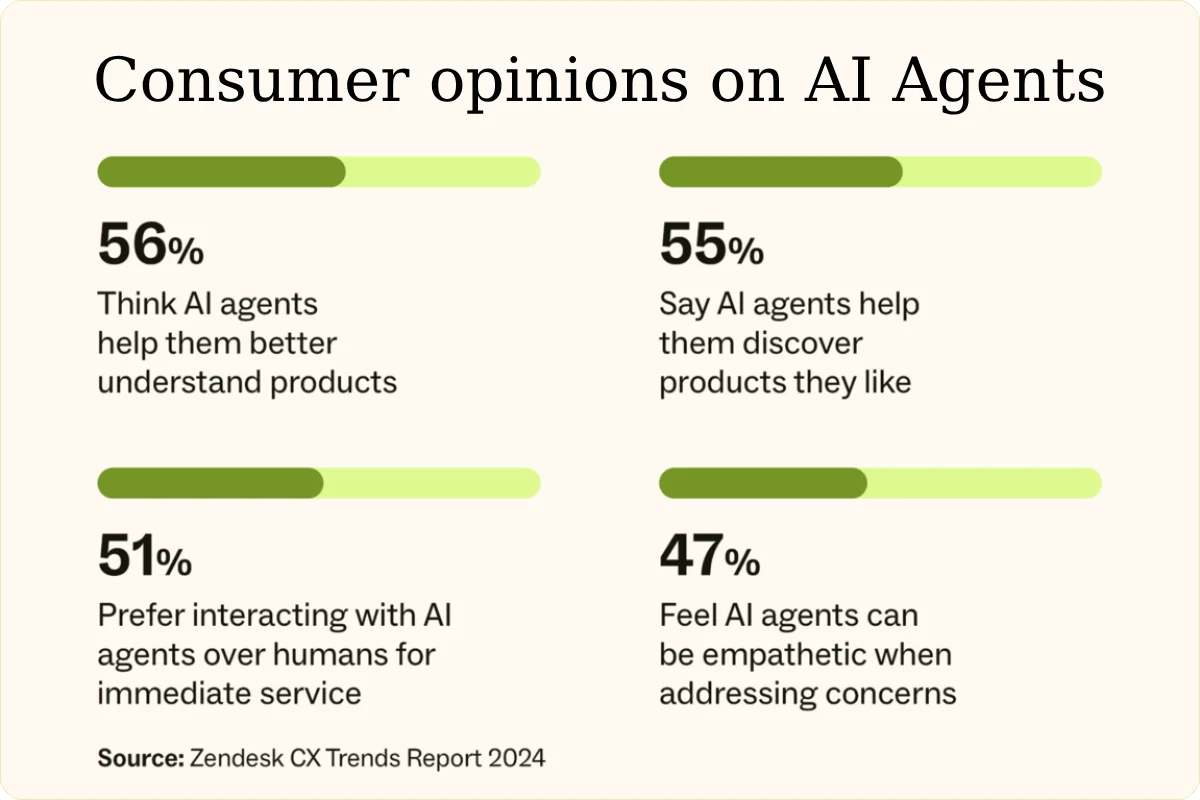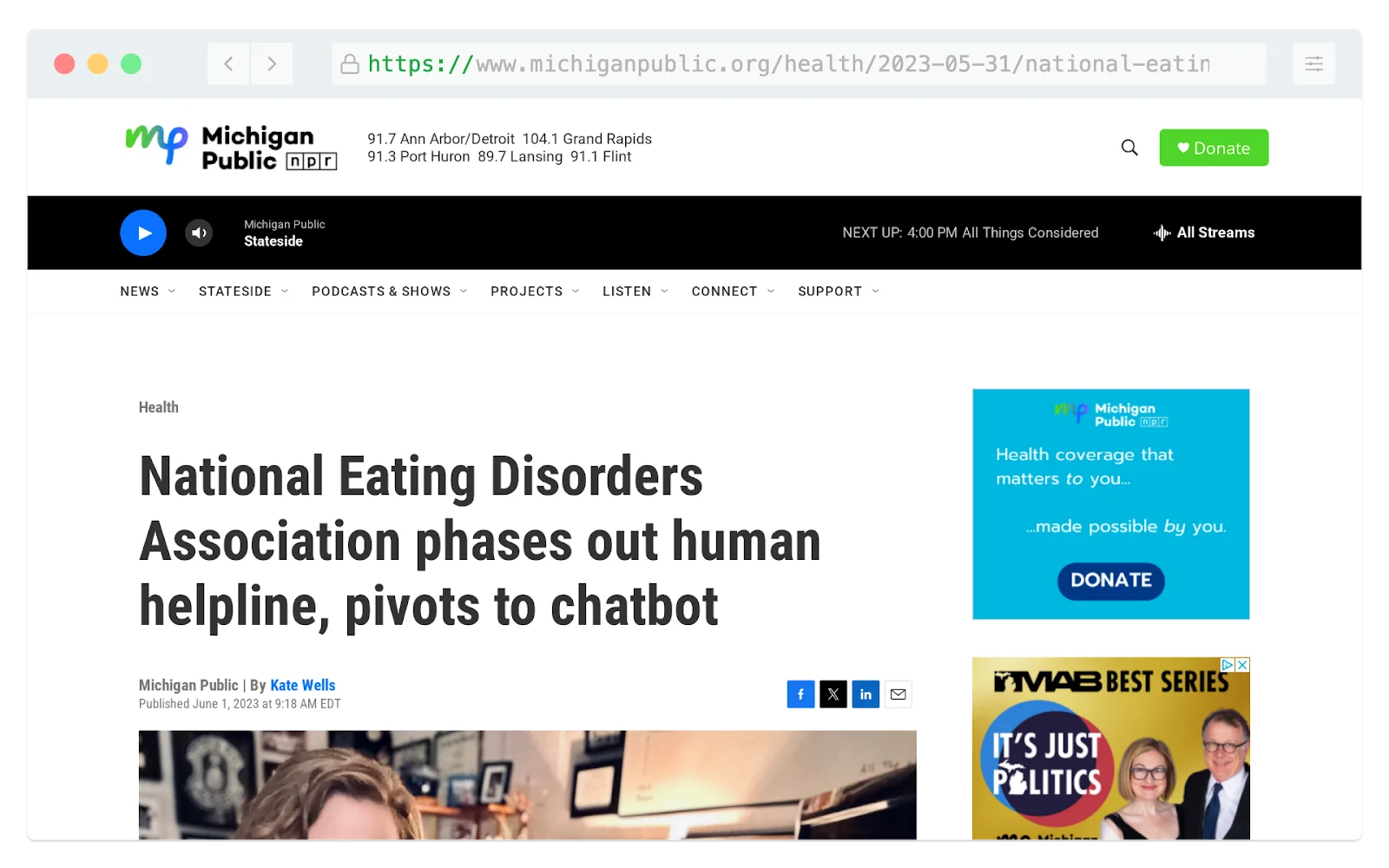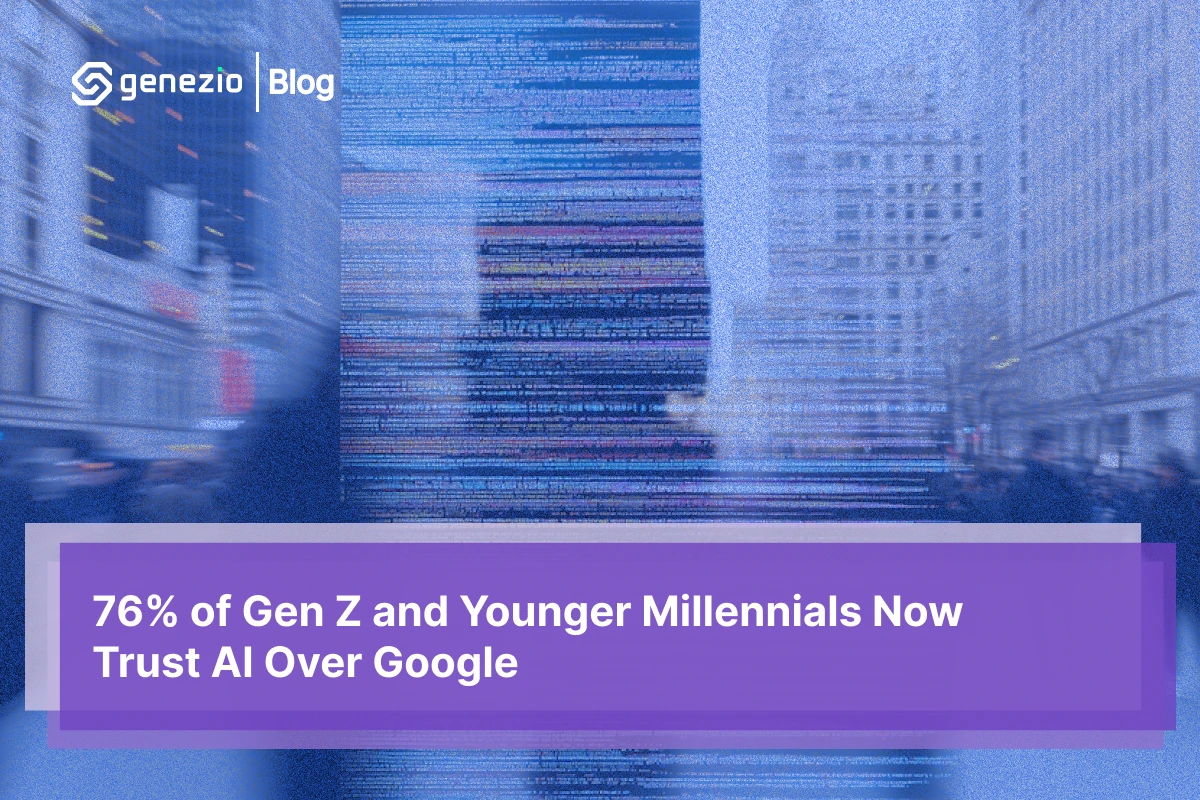
Luis Minvielle
Jun 03, 2025
According to a 2023 Zendesk report, 70% of CX leaders believe generative AI makes every digital customer interaction more efficient. It helps teams stay available 24/7, cut down wait times, and take care of simple requests. That’s also how most customers are using it. A Forrester custom study found that half of users turn to chatbots when they want a quick answer, and 44% use them when they need help after hours. And when it works, the impact is positive: a Cyara survey found that 61% of users say they’re more likely to return to a brand after a good chatbot interaction.
But the opposite is also true. A confusing or inaccurate reply can end the conversation before it starts. In fact, in the same Forrester study, 73% of customers agree chatbots still can’t handle complex questions, and 61% feel bots often don’t understand what they’re asking in the first place.

So, what are the benefits of using AI in customer service? Faster replies, lower costs, and support that’s always available.
And the risks? AI doesn’t always get it right. And when it fails, it can cost time, trust, or even legal trouble. The real challenge for businesses and Customer Care teams is to make sure their AI works as expected before it reaches real customers.
In this article, we’ll look at what those benefits are, what can go wrong, and how testing and monitoring with tools like Genezio can help Customer Care Experts trust their AI.
What are the benefits of using AI in Customer Service?
AI in customer service helps teams respond faster, cut support costs, and stay available whenever customers reach out, including outside regular hours. It allows companies to handle more requests with fewer people, which means they don’t need to grow call centers or split staff across multiple shifts. That’s why more and more businesses are turning to AI tools for customer support in 2025.
But speed and scale aren’t the only things that matter. Customer Care teams also need to care about accuracy and trust. And that’s where many companies pause. Because AI doesn’t always give the right answers. It might misunderstand what the customer means. Or give answers that sound plausible but are totally made-up. And when that happens, the consequences can be hard to overcome: lost sales, frustrated customers, and even legal trouble.
These are the tradeoffs that Customer Care leaders are thinking about. AI tools bring speed, but they also introduce new risks. So the real question becomes: how do you get the benefits of AI without compromising the quality of support your team is known for?
The short answer: you test the AI system before it goes live.
How can AI help customer service, and what are the risks?
When AI works well in customer service, it handles simple questions quickly—like password resets, shipping updates, or refund policies. This gives human agents more time to focus on harder problems. Customers also get faster responses, so they don’t have to wait in line or sit on hold.
This can make a big difference in industries that get high volumes of support requests, like online retail, banking, or telecom. AI agents can take care of the routine questions first, then pass more complex issues to someone who can help. That means shorter queues and better follow-through on open requests.
In healthcare, AI chatbots can walk patients through insurance forms, explain clinic hours, or help them find the right department. In banking, AI agents help people check balances, schedule payments, or learn how to dispute charges.
But the risk is real: if the AI gives incorrect, confusing, or made-up answers, the customer service experience breaks down. It can lead to broken trust, lost time, or even compliance issues. Fixing those mistakes often takes more time and effort than handling the issue directly.
Back in 2023, the National Eating Disorders Association (NEDA) had to take down its AI chatbot after it told users struggling with eating disorders to try fasting and counting calories. It gave the advice confidently, even though it was harmful and inappropriate. Of course, it wasn’t the AI that got blamed. When things go wrong, the responsibility always lands on the business, not the tool.

So what are the benefits of using AI in customer service? It helps with faster replies, shorter wait times, and handles routine questions, so human teams can focus where they’re needed most. The benefits of using AI in customer service are real, but only if the tools work the way they’re supposed to. That’s why testing is important before anything goes live.
Why AI needs testing before and after launch
Generative AI is trained on a huge amount of information. But it doesn’t always know where its knowledge ends. Sometimes, it produces answers that sound right but aren’t—this is known as hallucination. And it’s one of the main reasons why AI agents need to be tested before launch and continuously after.
Even well-trained agents can drift into topics they weren’t meant to cover and cause confusion. A banking chatbot trained to answer account questions might try to explain loan eligibility or offer investment tips. In healthcare, an agent meant to help with booking could end up offering medical advice—you can already imagine how that might end.
Still, the bigger risk isn’t a wrong answer. It’s that no one notices until it reaches a real customer. And by then, the damage is already done, especially in regulated fields.
In 2023, iTutorGroup used an AI system to screen job applicants. It ended up rejecting hundreds of older candidates based on age-related keywords. The company later paid $365,000 in a legal settlement. Though the AI wasn’t intentionally built to discriminate, it hadn’t been tested properly to catch that behavior. And that’s the point.
Customer Care Experts that use AI in their operations need a way to test how their AI agents perform—before launch and during day-to-day use. Ongoing testing helps catch hallucinations, wrong answers, and biased behavior early. That’s how teams stay in control.
How Genezio helps businesses trust their AI
Genezio gives Customer Care Experts a clear way to check how AI agents perform throughout their entire lifecycle. You can run tests that simulate real conversations and see how your agent handles common requests, unpredictable cases, or questions that might push it off course. These tests help teams understand where the agent does well and where it calls for some adjustments.
Businesses can book one-time reports or set up ongoing monitoring. For one-time reports, you choose what you want to test—billing questions, refund issues, or anything else your agent handles—and Genezio sends back results in 24 hours. If you want more regular tracking, you can set up automated tests that run daily, weekly, or on your own schedule.
Once the agent is live, Genezio keeps checking for problems like hallucinations, confusing answers, or drift into topics your team didn’t intend. If something looks off-topic, it flags it, so you can fix it before real customers are affected.
For Customer Care Experts, that means fewer surprises. And an extra layer of assurance that the AI is doing what it’s supposed to do.
The benefits of using AI in customer service only matter if the answers are correct. Genezio helps make sure they are. Try Genezio for free or book a demo to start testing today!
Article contents
Subscribe to our newsletter
DeployApps is a serverless platform for building full-stack web and mobile applications in a scalable and cost-efficient way.
Related articles
More from AI
Quality Monitoring Software: How To Make Sure AI Agents Benefit Support and Customers
Luis Minvielle
May 23, 2025
Multilingual Customer Service: Cost of Multilingual Misfires in AI Customer Service
Luis Minvielle
Jun 30, 2025






